MercoPress. South Atlantic News Agency
Tag: Mauricio Macri
-
Saturday, October 6th 2018 - 13:51 UTC
Macri's Buenos Aires ready for Olympic Youth Games

The opening ceremony of the Olympic Youth Games is scheduled for this Saturday, October 6, at the traditional Obelisk, while actual competition is scheduled to commence on Sunday with 22 sporting events.
-
Friday, October 5th 2018 - 09:03 UTC
Industrial activity in Argentina down 5.6% in August and 0.8% in last 12 months

August data for industry was only a slightly better figure than the previous month – in July, a decline of minus 5.7% was witnessed. In June, the sharpest, most pronounced fall of the year was witnessed: 8.1%, year-on-year.
-
Friday, October 5th 2018 - 08:36 UTC
Argentine Peso slips on Thursday on prospects of higher US interest rates

Argentina’s Peso fell on Thursday, pressured by the recession-hit country’s dismal inflation outlook and higher U.S. interest rates that have pushed capital away from riskier emerging markets and toward the greenback, local traders said. The peso shed 1.85% to close at 38.4 per dollar after having gained 9.58% over the previous three days under a freshly-renegotiated International Monetary Fund financing deal that calls for tougher fiscal and monetary policy measures.
-
Friday, October 5th 2018 - 07:07 UTC
Maradona thinking of politics: would love a presidential ticket with Cristina Fernandez
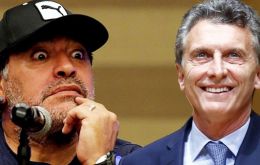
Argentine World Cup winner Diego Maradona has spoken of his interest in entering the world of politics in his home country, even offering to be the vice-presidential candidate to former leader Cristina Fernandez de Kirchner.
-
Friday, October 5th 2018 - 03:22 UTC
Emir of Qatar in Bs.Aires to meet with Macri over Vaca Muerta
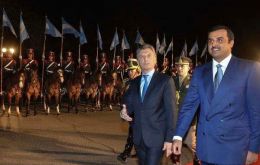
The emir of Qatar, Sheikh Tamim Bin Hamad Al Thani, arrived Thursday evening in Argentina to meet with President Mauricio Macri on Friday to discuss oil investments in Vaca Muerta and other bilateral issues.
-
Thursday, October 4th 2018 - 08:24 UTC
Argentine Peso strengthens for third day running supported by high interest rate for short term debt
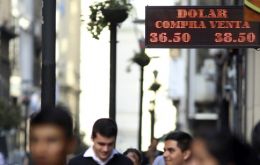
Argentina’s peso rallied for a third straight day on Wednesday, after high-interest short-term debt issued by the central bank soaked up liquidity, a strategy that has raised concern about the sustainability of the country’s program.
-
Tuesday, October 2nd 2018 - 08:21 UTC
Argentine Peso rises 4% after central bank sells seven-day notes paying 72%
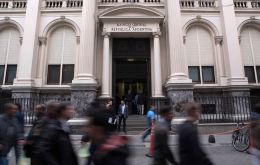
The he Argentine peso climbed more than 4% on Monday trading on the back of a debt sale by the central bank aimed at mopping up excess liquidity and signs that the International Monetary Fund (IMF) is solidly behind the administration of president Mauricio Macri.
-
Monday, October 1st 2018 - 08:56 UTC
Beijing currency swap support for Argentina
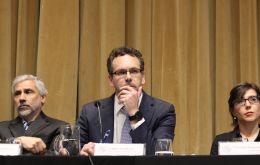
Argentina has “nearly closed” a new currency swap deal with China that will add the equivalent of US$ 9 billion to the South American country’s reserves, the central bank said on Sunday. Argentina and China first agreed to a swap program in 2009 to boost the South American country’s dwindling reserves under former President Cristina Fernandez. Last year, the center-right government of President Mauricio Macri and China agreed to extend the program for three more years.
-
Friday, September 28th 2018 - 08:34 UTC
Controversial Almagro’s “complete support” for the Referral to ICC of Venezuela Investigation
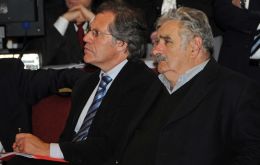
The controversial Secretary General of the Organization of American States (OAS), Luis Almagro, expressed his complete support for the decision of the presidents of Argentina, Mauricio Macri; of Chile, Sebastián Piñera; of Colombia, Iván Duque; of Paraguay, Mario Abdo Benítez; of Peru, Martín Vizcarra; and of the Prime Minister of Canada, Justin Trudeau, to refer to the International Criminal Court (ICC) the investigation into the existence of crimes against humanity in Venezuela.
-
Friday, September 28th 2018 - 07:55 UTC
President Macri asks for patience; poverty index shows 27,3% Argentines live in poverty
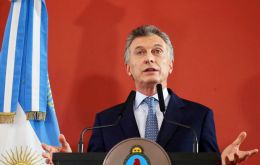
President Mauricio Macri on Thursday asked Argentines for patience in weathering an economic crisis this year and pledged to increase social spending in the coming months, a day after reaching a US$ 57.1 billion deal with the International Monetary Fund.
